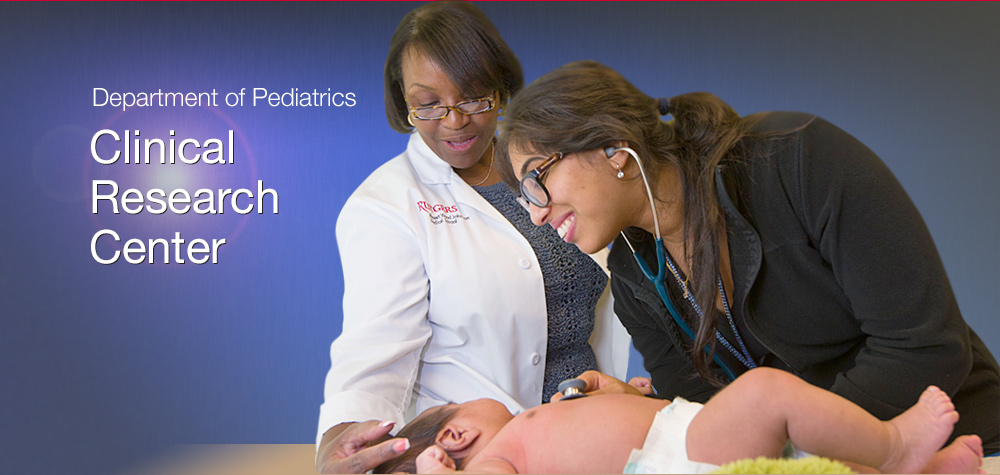-
About RWJMS
- Departments / Institutes
- Alumni
- Make a Gift

Subspecialty Services - Clinicians Directory
Subspecialty Services Guide
Diversity, Equity, Inclusion & Accessibility
Annual Report
Giving to the Department
FY24 Pediatric & System Grand Rounds
Affiliations and Collaborations
Divisions, Centers & Institutes
Message from Chair
Our Team
Current Residents
Graduates
Curriculum
Benefits
Diversity
The Resident Experience
Resident Support
Apply
Location
Contact Us
Pediatric Hematology/Oncology Fellowship
Developmental Behavioral Pediatrics Program
Neonatology Program
Pediatric Endocrinology Fellowship Program
Active Studies
-
Focal Segmental Glomerulosclerosis (FSGS) Clinical Trial
This is a multi-center, randomized trial to compare the effectiveness of a treatment regimen including cyclosporine (CSA) to a regimen including mycophenolate mofetil (MMF) and oral pulse steroids in inducing the remission of proteinuria in participants with steroid resistant FSGS. Both regimens contain an ACE inhibitor and alternate day low dose prednisone. In addition to this, another study will assess the safety and tolerability of two novel drugs, a TNF-a antagonist and a PPAR-g agonist, in patients with resistant FSGS. Participants must be between the ages of 2-40 years old at the onset of signs or symptoms of FSGS to join these studies. -
Chronic Kidney Disease in Children - Prospective Cohort Study (cKiD)
cKiD is an observational, epidemiological study of children ages 1-16 years old with mildly to moderately impaired kidney function. The primary goals of this study are to determine the risk factors for kidney function decline and define how this progressive decline impacts neurocognitive function and behavior; the risk factors for cardiovascular disease; and growth failure with its associated morbidities. Participation involves annual study visits where kidney function is measured through glomerular filtration rate-iohexol plasma disappearance. Neurocognitive and behavioral tests will also be administered and cardiovascular risk factors monitored through blood pressure and ECHO exams. Annual visits will last for up to four years. -
Genetic Components of Autism Spectrum Disorders
This is a 5-year study that aims to examine the role of genes in the development of autism. Children that are 4 years old or older and have been diagnosed as having autism and at least five family members will be enrolled. The child's mental health and development will be assessed through physical examinations and clinical assessments, which will be videotaped. Family members will receive scheduled home visits and will be asked to donate blood or cheek cell samples. A battery of intelligence, standard behavioral, language, and reading tests will also be administered to each member. Such tests will last 3-5 hours, while testing the entire family takes most of the day. All subject contact, from screening through testing, should be completed over the course of a month. -
A Long-Term Safety Study of a Combination Product Containing Sumatriptan Succinate and Naproxen Sodium for the Treatment of Migraine in Adolescents
This open-label, single-arm, multi-center, out patient study aims to evaluate the safety and tolerability of a combination tablet containing both sumatriptan succinate and naproxen sodium in the long term treatment of migraine in adolescents 12 to 17 years old. Subjects will use an e-diary to measure quality of life and treatment satisfaction. Treatment will last up to 12 months. -
An Open Label Study to Elavuate the Single-dose Pharmakinetics and Safety of Ceftobiprole in Pediatric Subjects 3 months - 18 years of age Undergoing Treatment with Systemic Antibiotics
The object of this study is to evaluate the pharmacokinetics of ceftobiprole in patients three months old to eighteen years of age, who require therapeutic or prophylactic therapy with systemic antibiotics. Ceftobiprole is a broad spectrum IV cephalosporin, with activity against MRSA, currently in phase 3 clinical trials. It is also active against Enterococcus faecalis, Escherichia coli, Klebsiella pneumoniae, Proteus mirabilis, Morganella morganii, Pseudomonas aeruginosa, Haemophilus influenzae, Neisseria gonorrhoeae, Moraxella catarrhalis, and various other bacteria. Total duration of the study is approximately 18 days with three separate phases: a 24-48 hour screening phase, a 2 day open label treatment phase, and a post treatment phase.
-
The Interaction of Weight and Asthma in Children
This project is aimed at studying the association between a child's weight and asthma, and will occur in conjunction with "A New Weigh", a 12-week, multidisciplinary weight management program designed for overweight children between ages 3 to 18 years, being conducted by the Adolescent Division at the BMSCH at RWJUH. In addition to asthma screening, the children will also be screened for sleep problems and allergies.